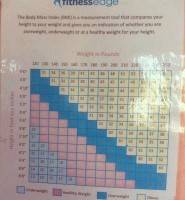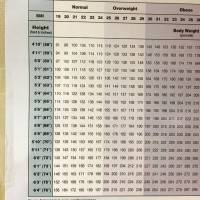BMI surgery
BMI less than 30 for safe mommy makeover
The Body Mass Index may not be perfect (like the cup size system), but because it is an objective measurement it is used for studies on the relationship of body weight to surgical complications.
It was developed as a more consistent measure than the Metropolitan Life Insurance company’s height/weight tables, which were created in order to actuarially relate weight to health and longevity so that insurance rates could be determined.
The bottom line is a BMI of 25-30 is considered overweight, and the risk of complications from surgery increases when it is greater than 30.
These are not value judgments, just data which can be used to maximize safety for elective surgery. (Richard Baxter, MD, Seattle Plastic Surgeon)
BMI for surgery varies
Body mass index (BMI) takes into account weight and body surface area. Because that is all that it takes into account it may not be completely accurate for surgical decision making without taking into affect other factors.
In general, a BMI of 30 or less is considered ideal but this can vary. If you have loose, hanging skin around your abdomen, you may be able to undergo and benefit from a tummy tuck regardless of BMI. Either photos or an in person consultation would be needed. (Remus Repta, MD, Scottsdale Plastic Surgeon)
What is the ideal BMI to consider a tummy tuck surgery? I’ve read several varying reports.
The answer in general is below 30 and the lower the better. But with the physique you describe, it is not a good measurement. The best thing to do is lay flat on your back on the floor and if and when your tummy is lower than your ribs, you are ready for a surgery. (Ronald V. DeMars, MD, Portland Plastic Surgeon)
Optimal BMI surgery
Your BMI is around 31, which is a bit higher than ideal. The ideal number can vary from patient to patient. I typically encourage patients to try to get as close to 25 as possible. Between 25-30 is still very good, and is what I see most frequently.
A BMI over 30 increases the risk of complications in both breast and body surgery. Additonally, if there is still alot of fat under the abdominal skin, it is more difficult to move the skin and excise the maximal amount.
This will resullt in a suboptimal outcome. A photograph would be very helpful but is no substitute for an in-person exam. If you still have alot of fat inside your abdomen (intraperitoneal fat, around the organs), then your result will be severly limited because that fat cannot be treated with excisional surgery. Only a physical exam by a board certified plastic surgeon can answer your question completely. (Matthew H. Steele, MD, Fort Worth Plastic Surgeon)
Ideal weight for a tummy tuck surgery
An ideal BMI for any surgery may be 24, but I can’t recall the last time was when a patient met all of the “ideal” values. More importantly would be to be healthy, a non smoker and to have the approval of your private physician who knows you well, medically speaking.
Having lost weight to the weight that you feel most comfortable at, as well as a weight that you can maintain comfortably is more important. I don’t want my patients to be overweight to any degree if they can help it, but as you know when one loses weight there is a weight that you think is sustainable for a long time, and further attempts at weight loss may prove to be near impossible.A thorough examination by a Plastic Surgeon who you feel performs this operation often is most helpful. This is where the serious discussion will be made. (Francis (Frank) William Rieger, MD, Tampa Plastic Surgeon)
Ideal BMI surgery
- Your BMI surgery for tummy tuck
- The BMI surgery
- BMI surgery weight
- BMI surgery image
There is not really an one ideal BMI for patients having tummy tuck surgery. What is important is that increased BMI is one factor indicative of increased risk during (and after) surgery. BMI great than 30 (yours is 31.17) is associated with slightly higher risk than BMI less than 30. BMI of greater than 34 or 35 has been shown in several studies to be associated with increased risk such as delay in healing, seroma, etc.
If you have no other medical problems (smoking, poorly controlled diabetes, hypertension, or elevated cholesterol), you may have less overall risk than someone with a BMI of 30 that DOES have other significant medical conditions such as the ones I mentioned. All of the concerns should be discussed in person with your BCPS prior to any surgery! (Andrew P. Amunategui, MD, Miami Plastic Surgeon)












